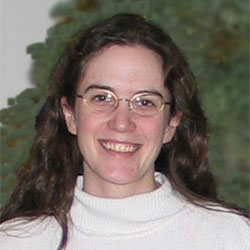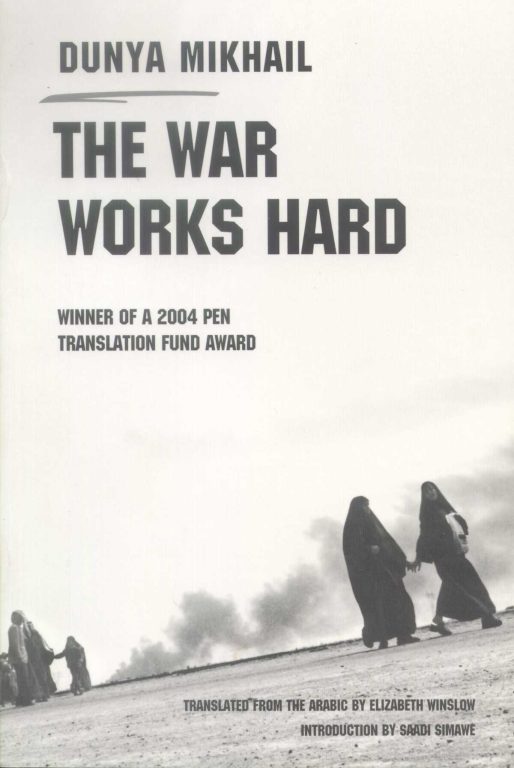
Elizabeth Winslow is a fiction writer and a graduate of the Iowa Writers’ Workshop. Her translation of Dunya Mikhail’s The War Works Hard won the PEN prize for translation in 2004 and was published by New Directions in 2005.
She has had other translated poems published in Modern Poetry in Translation, Poetry International, Words Without Borders, Circumference and World Literature Today and short stories or non-fiction published in Phoebe, Blue Mesa Review, Louisville Review and Variety.

Judges’ Citation
In Elizabeth Winslow’s perfect translations, poetry takes on its ancient function of restoring meaning to the language. Here is the war in Iraq in English without a single lie.
Selected poems
by Elizabeth Winslow
Please don’t ask me, America.
I don’t remember
on which street,
with whom,
or under which star.
Don’t ask me …
I don’t remember
the colors of the people
or their signatures.
I don’t remember if they had
our faces
and our dreams,
if they were singing
or not,
writing from the left
or the right
or not writing at all,
sleeping in houses
on sidewalks
or in airports,
making love or not making love.
Please don’t ask me, America.
I don’t remember their names
or their birthplaces.
People are grass –
they grow everywhere, America.
Don’t ask me …
I don’t remember
what time it was,
what the weather was like,
which language,
or which flag.
Don’t ask me …
I don’t remember
how long they walked under the sun
or how many died.
I don’t remember
the shapes of the boats
or the number of stops …
How many suitcases they carried
or left behind,
if they came complaining
or without complaint.
Stop your questioning, America,
and offer your hand
to the tired
on the other shore.
Copyright © 1993, 1997, 2000, 2005 by Dunya Mikhail / translation 2005 by Elizabeth Winslow
America
the Arabic written by Dunya Mikhail
Please don’t ask me, America.
I don’t remember
on which street,
with whom,
or under which star.
Don’t ask me . . .
I don’t remember
the colors of the people
or their signatures.
I don’t remember if they had
our faces
and our dreams,
if they were singing
or not,
writing from the left
or the right
or not writing at all,
sleeping in houses
on sidewalks
or in airports,
making love or not making love.
Please don’t ask me, America.
I don’t remember their names
or their birthplaces.
People are grass —
they grow everywhere, America.
Don’t ask me . . .
I don’t remember
what time it was,
what the weather was like,
which language,
or which flag.
Don’t ask me . . .
I don’t remember
how long they walked under the sun
or how many died.
I don’t remember
the shapes of the boats
or the number of stops . . .
How many suitcases they carried
or left behind,
if they came complaining
or without complaint.
Stop your questioning, America,
and offer your hand
to the tired
on the other shore.
Offer it without questions
or waiting lists.
What good is it to gain the whole world
if you lose your soul, America?
Who said that the sky
would lose all of its stars
if night passed without answers?
America, leave your questionnaires to the river
and leave me to my lover.
It has been a long time,
we are two distant, rippling shores
and the river wriggles between us
like a well-cooked fish.
It has been a long time, America,
(longer than the stories of my grandmother
in the evening)
and we are waiting for the signal
to throw our shell in the river.
We know that the river is full
of shells
this last one
wouldn’t matter,
yet it matters to the shell . . .
Why do you ask all these questions?
You want our fingerprints
in all languages
and I have become old,
older than my father.
He used to tell me in the evenings
when no trains ran:
One day, we will go to America.
One day, we will go
and sing a song,
translated or not translated,
at the Statue of Liberty.
And now, America, now
I come to you without my father.
The dead ripen faster
than Indian figs,
but they never grow older, America.
They come in shifts of shadow and light
in our dreams
and as shooting stars
or curve in rainbows
over the houses we left behind.
They sometimes get angry
if we keep them waiting long . . .
What time is it now?
I am afraid I will receive
your registered mail, America,
in this hour
which is good for nothing . . .
So I will toy with the freedom
like teasing a pet cat.
I wouldn’t know what else
to do with it
in this hour
which is good for nothing . . .
And my sweetheart
there, on the opposite
shore of the river
carries a flower for me.
And I — as you know —
dislike faded flowers.
I do like my sweetheart’s handwriting
shining each day in the mail.
I salvage it from among ad fliers
and a special offer:
“Buy One Get One Free”
and an urgent promotional announcement:
“Win a million dollars
if you subscribe to this magazine!”
and bills to be paid
in monthly installments.
I like my sweetheart’s handwriting
though it gets shakier every day.
We have a single picture
just one picture, America.
I want it.
I want that moment
(forever out of reach)
in the picture which I know
from every angle:
the circular moment of sky.
Imagine, America,
if one of us drops out of the picture
and leaves the album full
of loneliness,
or if life becomes
a camera
without film.
Imagine, America!
Without a frame,
the night will take us
tomorrow,
darling,
tomorrow
the night
will take us
without a frame.
We will shake the museums
forever from their sleep,
fix our broken clocks
so we’ll tick in the public squares
whenever the train
passes us by.
Tomorrow,
darling,
tomorrow
we will bloom:
two leaves of a tree
we will try not to be
too graceful and green
and in time
we will tumble down like dancers
taken by the wind
to the places whose names
we’ll have forgotten.
We will be glad for the sake of turtles
because they persist along their way . . .
Tomorrow
darling,
tomorrow,
I’ll look at your eyes
to see your new wrinkles,
the lines of our future dreams.
As you braid my gray hair
under rain
or sun
or moon,
every hair will know
that nothing happens
twice,
every kiss a country
with a history
a geography
and a language
with joy and sadness
with war
and ruins
and holidays
and ticking clocks . . .
And when the pain in your neck returns, darling,
you will not have time to complain
and won’t be concerned.
The pain will remain inside us
coy as snow that won’t melt.
Tomorrow, darling,
tomorrow,
two rings will jingle
in the wooden box.
They have been shining for a long time
on two trembling hands,
entangled
by the absence.
Tomorrow,
the whiteness will expose
all its colors
as we celebrate the return
of what was lost
or concealed
in the whiteness.
How should I know, America,
which of the colors
was the most joyful
tumultuous
alienated
or assimilated
of them all?
How would I know, America?
Copyright © 2005, Elizabeth Winslow, translated from the Arabic written by Dunya Mikhail, The War Works Hard, New Directions Publishing
America
the Arabic written by Dunya Mikhail
The hypothesis: I am tense and so are you.
We neither meet nor separate.
The desired result: We meet in the absence.
The proof: As tension turns people into arcs, we are two arcs.
We neither meet nor separate (the hypothesis)
so we must be parallel.
If two parallel lines are bisected by a third line
(in this case, the line of tension)
their corresponding angles must be equal (a geometrical theorem).
So we are congruent (because shapes are congruent
when their angles are equal)
and we form a circle (since the sum
of two congruent arcs
is a circle).
Therefore, we meet in the absence
(since the circumference of a circle
is the sum of contiguous points
which can each be considered
a point of contact).
Copyright © 1993, 1997, 2000, 2005 by Dunya Mikhail / translation 2005 by Elizabeth Winslow
The Theory of Absence
the Arabic written by Dunya Mikhail
How magnificent the war is!
How eager
and efficient!
Early in the morning,
it wakes up the sirens
and dispatches ambulances
to various places,
swings corpses through the air,
rolls stretchers to the wounded,
summons rain
from the eyes of mothers,
digs into the earth
dislodging many things
from under the ruins …
Some are lifeless and glistening,
others are pale and still throbbing …
It produces the most questions
in the minds of children,
entertains the gods
by shooting fireworks and missiles
into the sky,
sows mines in the fields
and reaps punctures and blisters,
urges families to emigrate,
stands beside the clergymen
as they curse the devil
(poor devil, he remains
with one hand in the searing fire) …
The war continues working, day and night.
It inspires tyrants
to deliver long speeches,
awards medals to generals
and themes to poets.
It contributes to the industry
of artificial limbs,
provides foods for flies,
adds pages to the history books,
achieves equality
between killer and killed,
teaches lovers to write letters,
accustoms young women to waiting,
fills the newspapers
with articles and pictures,
builds new houses
for the orphans,
invigorates the coffin makers,
gives grave diggers
a pat on the back
and paints a smile on the leader’s face.
The war works with unparalleled diligence!
Yet no one gives it
a word of praise.
Copyright © 2005, Elizabeth Winslow, translated from the Arabic written by Dunya Mikhail, The War Works Hard, New Directions Publishing
The War Works Hard
the Arabic written by Dunya Mikhail
I saw a Ghost pass in the mirror.
Someone whispered something in my ear.
I said a word, and left.
Graves were scattered with mandrake seeds.
A bleating sound entered the assembly.
Gardens remained hanging.
Straw was scattered with the words.
No fruit is left.
Someone climbed on the shoulders of another.
Someone descended into the netherworld.
Other things are happening
in secret.
I don’t know what they are—
This is everything.
Copyright © 2006
What’s new?
the Arabic written by Dunya Mikhail